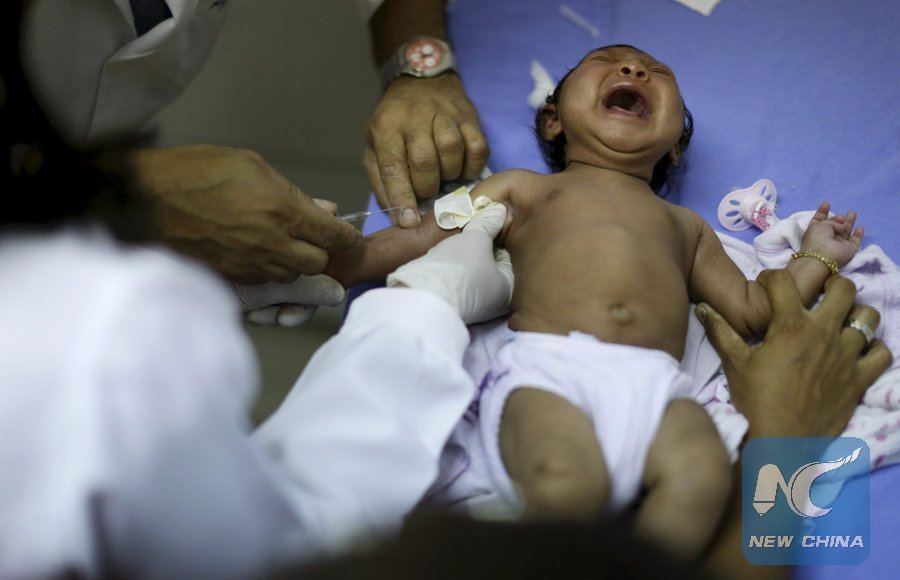 Oswaldo Cruz Hospital staff prepare to draw blood from baby Ludmilla Hadassah Dias de Vasconcelos, who has microcephaly, at the Oswaldo Cruz Hospital in Recife, Brazil, January 26, 2016. Picture taken on January 26, 2016. (REUTERS/Ueslei Marcelino)
Oswaldo Cruz Hospital staff prepare to draw blood from baby Ludmilla Hadassah Dias de Vasconcelos, who has microcephaly, at the Oswaldo Cruz Hospital in Recife, Brazil, January 26, 2016. Picture taken on January 26, 2016. (REUTERS/Ueslei Marcelino)
SAN FRANCISCO, Feb. 26 (Xinhua) -- A researcher at University of California, Berkeley, is launching a startup called KarnaTeq to develop and market a technology to increase the diagnostic power of scalpel-free biopsy.
The ideal non-surgical approach might start with a simple blood draw. Snippets of DNA or RNA detected in the blood could be analyzed for the presence of a tumor; whether it has metastasized and whether it carries mutations for resistance to specific drugs.
Such "liquid biopsies" are based on the fact that cancer cells commonly shed bits of DNA into the blood.
In several recent cancer clinical trials, researchers isolated DNA from patients' blood and amplified it for analysis. In a DNA study from one specialized type of treatment, they were able to identify most of the treatment-resistant mutations that had been detected through conventional, invasive biopsies. In fact, DNA sequencing revealed some mutations that the original biopsies had missed.
With support from the Bakar Fellows Program, which fosters faculty entrepreneurship at UC Berkeley, Kathy Collins, professor of biophysics, biochemistry, and structural biology, is developing new techniques to scrutinize the total content of RNA in blood - a strategy that she thinks may add vital clues missed by DNA analysis.
"RNA is DNA in action," Collins was quoted as saying in a news release. While DNA holds the blueprint for making all the proteins in the body, it hands off to RNA only the instructions that the cell needs. As a result, this "messenger RNA" carries the up-to-date information on cells' conditions and needs. "Sequencing RNA from liquid biopsies will allow us to see not only the state of a cancer but also the molecular signatures of any normal tissue that is in trauma from a treatment."
In her words, DNA sequences may be easier to find, but they don't hold all the clues. "We don't want to bias our understanding by getting only a partial picture."
Collins has developed a new technology that employs a type of enzyme that she has studied for more than 20 years. It is called a reverse transcriptase because it can translate, or transcribe, RNA into DNA -- the reverse of the classic "Watson and Crick" DNA to RNA process. She is particularly interested in applying the new strategy to study RNA held in bubble-like vesicles, called exosomes, secreted by cancer cells into the blood. Very little is known about them, but many scientists suspect that DNA, RNA and other molecules packed inside the vesicles can provide unique insights into cancer's progress in a patient.

